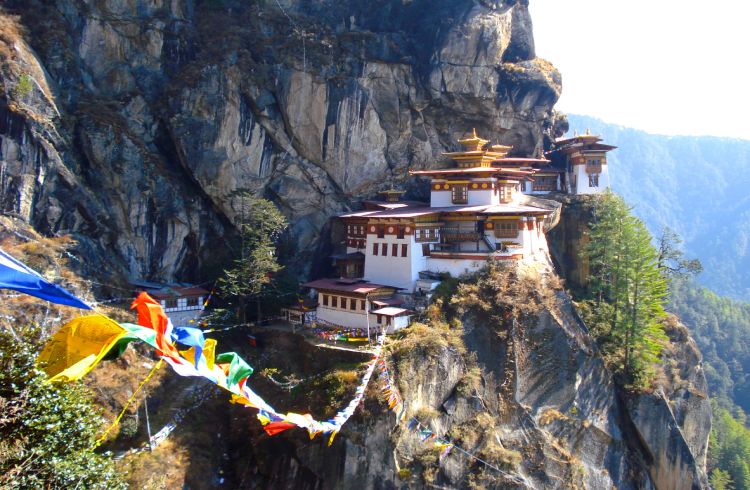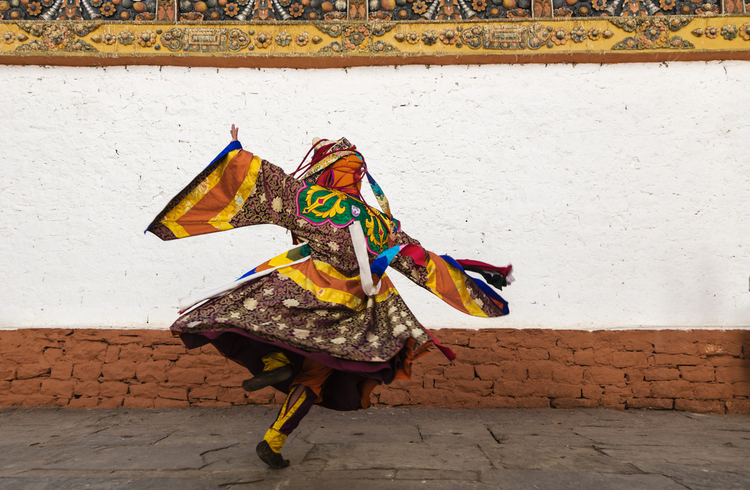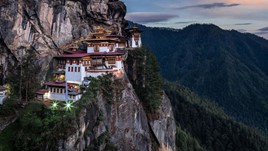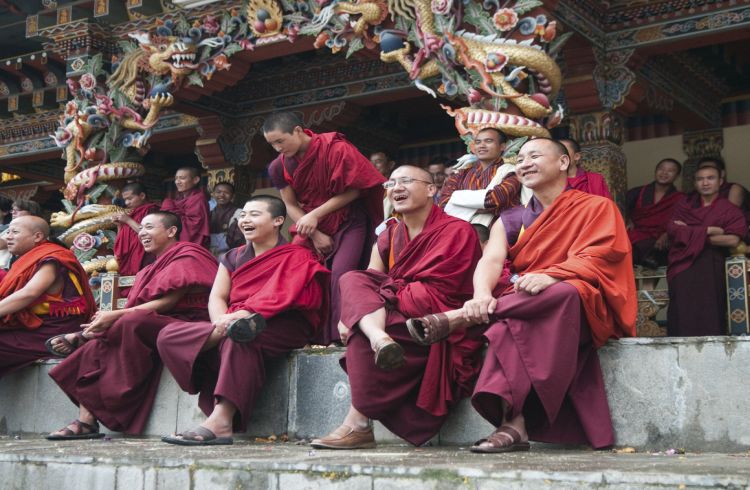Travel tips: Laws, Visas and Customs for Travelers in Bhutan
Considered to be the world's last Shangri-La, the small Himalayan kingdom of Bhutan tightly controls tourism. Here's what you need to know about laws, etiquette and visas.
 Photo © iStock/DanLinPhotography
Photo © iStock/DanLinPhotography
Bhutan started to welcome tourists in 1974, when the government decided it was a good idea to promote the country's natural beauty, culture and rich traditions to the outside world.
Since the first 287 tourists arrived in this ancient kingdom, numbers have steadily risen each year however the government has maintained tight controls to ensure tourism is not just sustainable but regulated to the benefit of the country.
Health and happiness
This is a country that takes the health of its people seriously - instead of worrying about Gross National Product they worry about the Gross National Happiness of their population.
The government believes this is achieved via the four main pillars:
- Equitable and equal socio-economic development
- Preservation and promotion of cultural and spiritual heritage
- Conservation of environment
- Good governance which is interwoven, complementary and consistent
While this is one of the most isolated countries in the world, Bhutan must be onto something as other countries and the United Nations are adopting this concept.
Bhutan was also the last country in the world to introduce television. The internet and TV were only de-criminalized in 1999. The capital Thimpu, still doesn't have traffic lights!
At any sign of rising social problems, traditionalists in Bhutan warn of the dangers of the outside world however things don't seem to be slowing down with over 250,000 tourists visiting in the country in 2017.
Visas
Pretty much everyone except travelers from India, Maldives and Bangladesh require a visa to enter the country. Visas must be applied for in advance via your tour operator who will process the paperwork and the fee for you. Don't forget to make sure your passport has at least 6 months of validity from day of departure from Bhutan.
Once the visa has been approved, your tour operator will receive the confirmation number and you'll receive the visa upon arrival into the country.
Even the airlines, Bhutan Air and Druk Air can't issue tickets to passengers unless they received the visa confirmation number. So as you can see, things are pretty tightly regulated from the get go.
Upon leaving Bhutan, travelers will have to pay a US$20 departure tax. Foreigners (apart from Indian nationals) may only enter or depart the country through certain towns by road such as Phuntsoling, Samdrup Jongkhar and Gelephu; or by air into Paro International.
Even if you do gain access to the country, certain areas may only be visited with a special permit that will be obtained by your tour operator. These areas are generally anything outside the Paro and Thimphu Valleys. Prior authority, (also obtained by your tour operator) is required to visit some of the religious and administrative buildings (dzongs).
While Bhutan's strict policies, especially on visitors, might seem onerous they also ensure travelers a truly unique experience in one of the last places on earth touched by the modern world.
Local laws in Bhutan
Traveling within Bhutan
It's difficult to travel independently through Bhutan (unless you have certain visas), so you will need to book all your travel activities via a Bhutanese Government licensed tour operator. Backpacking through the country is prohibited by the government but most tour operators offer some degree of flexibility e.g private tours vs group tours.
The Bhutanese Government has imposed a strict minimum spend on visitors to the kingdom – currently between US$200 to $250 a day depending on the time of year. This includes items such as local ground travel, guide services, trekking equipment, meals, accommodation, local taxes and fees.
Don't diss the royals
While Bhutan switched from an absolute monarchy to a constitutional monarchy in 2008, the royal family of Bhutan are still revered by their people as they are seen as being closest to the gods.
It's also a good idea to avoid talking politics given the country's position between China and India, due to current tensions.
Respecting nature
Nature is an integral part of Bhutanese culture and religion as they believe everything is alive in some way. The Bhutanese also believe it's essential to live in harmony with nature so it's taught from an early age including at school. It's this respect which has seen Bhutan become famous for its pristine wilderness areas.
Avoid taking natural things like stones as souvenirs or skipping stones into a lake as they believe they are the home of the deities.
Photography & electronics in Bhutan
If you do decide to make the journey be prepared to have all personal computers, cellular telephones, cameras, or any other electronic devices registered with Bhutanese customs upon arrival.
These items will also be checked upon departure, so hang onto that declaration slip they give you upon arrival.
Bhutan is a photographer's paradise, but there are some spiritual and government buildings where getting those holiday snaps is a no go including the famous Tiger's Nest Monastery. Always ask for permission before taking photos of people.
Importing-exporting goods
You may think that carving or statue would look great in your home but exporting any antiques is forbidden and monitored by the authorities. Ask your guide prior to purchasing who can arrange a check with the government.
Tobacco in Bhutan
You can't buy or sell tobacco in Bhutan due to a ban in 2010, so you will need to bring your own supply (up to 200 cigarettes) for personal use and declare it on arrival where it will be subject to a sales and customs tax.
As a result of the ban, tobacco use has increased in the country thanks to the black market and smuggling, with Bhutan now having one of the highest rates of smoking in southern Asia compared to before the ban. Smoking is also banned in public places, restaurants and offices too. Maybe it's just easier (and better for you) to inhale in that fresh mountain air instead.
Etiquette in Bhutan
Dress modestly
There are plenty of beautiful temples and other spiritually significant places in Bhutan so if you plan to check them out, it's a good idea to dress respectfully. While temperatures in the summer can nudge 90°F (32°C), it's best not to get around as if you were heading to the beach. Many places require long sleeve clothing in order to enter such as Tiger's Nest Monastery.
Prayer Wheels
If you are visiting a monastery, temple or stupa always walk around the prayer wheels in a clockwise direction. This shows respect for the religion and brings blessings to those who do it.
Tipping in Bhutan
Tipping is largely voluntary in Bhutan however it's a nice gesture to give something in thanks to those who made your stay easier such as your driver, guide, trekking staff etc but also if you are heading to more rural places within Bhutan as most locals who offer homestay experiences earn very little. Place it it in an envelope and hand it to them on the last night of your stay.
Hotels and restaurants already have service charges in place so tipping is generally not needed, but give the hotel porter something if they go out of their way to help.
Giving gifts
Like many places around the world, it's generally advised not to bring gifts as it can encourage a culture of begging however if you are visiting a school; a gift of pencils, books or other equipment may be welcomed. Chat with your tour company to find out what is the best option.
Learn the local lingo
The Bhutanese locals love it if you give speaking the local language a go. It's also good to take the time to observe the local ways and greetings. Always ask your guide if you are unsure.
Related articles
Simple and flexible travel insurance
You can buy at home or while traveling, and claim online from anywhere in the world. With 150+ adventure activities covered and 24/7 emergency assistance.
Get a quote


1 Comment